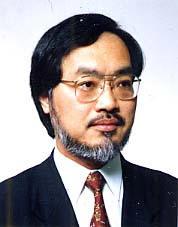|
IEEE
ICMA 2020 Conference
Plenary Talk I
Intelligent Robotic System with Machine Learning
Toshio Fukuda, Ph.D.
Professor
Meijo University, Japan
1 Chome-501 Shiogamaguchi, Tempaku Ward, Nagoya, Japan
Postcode: 486-8502, Japan
E-mail: t.fukuda@ieee.org
http://www.mein.nagoya-u.ac.jp

Abstract:
Recent robot technology (RT) has made remarkable progress in both manufacturing and service sectors. Because of this RT advanced technology, there are growing demands to make robots work more friendly and flexible coordinated with human for service. There are many research and developing works undergoing for robot and human interaction, such as assistance and supports of human by robots in manufacturing, inspection and maintenance, entertainment, education, bio-medical applications, rehabilitation and techno-care of aged people. Robot is required to have the more flexibility and adaptation control to human behavior,
more friendly robot and human interface, and estimation capability of human intention some way to make more proactive motion. There are a lot of problems to solve them with robotic sensor, actuator, control, communication and interface with human.
This talk is an overview of the Multi-scale robotics, based on the Cellular Robotics System, which is the basic concept of the emergence of intelligence in the multi-scale way from Organizational Level, Distributed robotics to Biological Cell engineering and Nano-robotics, which was proposed more than 30 years ago. It consists of many elements how the system can be structured from the individual to the group/society levels in analogy with the biological system. It covers with the wide range of challenging topics, but intelligent robotics is focused in this talk:
1. Distributed autonomous robotic system
2. Cooperation and competition of the multiple robotics system
3. Individual robot level, Brachiation Robots and Multi-locomotion robots
4. Medical robotics and simulator
5. Micro and nano robotics system
6. Bio analysis and bio-synthesis: bio-robotics system
7. Cyborg and Bionic System
8. Other systems
Then I mainly focus on Robotics and AI and refer to applied areas for the future hybrid system to improve the quality of life of human.
Prof. Toshio Fukuda
(M'83-SM'93-F'95) graduated from Waseda University, Tokyo, Japan in 1971 and received the Master of Engineering degree and the Doctor of Engineering degree both from the University of Tokyo, in 1973 and 1977, respectively. He studied at Graduate School of Yale University in 1973-1975. He joined the National Mechanical Engineering Laboratory in Japan in 1977, the Science University of Tokyo in 1982, and then joined Department of Mechanical Engineering, Nagoya University, Japan in 1989. He worked at University of Stuttgart, as Humboldt Fellow in 1979-1981.
He is Professor Emeritus of Nagoya University and Professor of Meijo University and Waseda University as well as Beijing Institute of Technology. He has been working as Professor of Shenyang University of Technology, Suzhou University, Institute of Automation, Chinese Academy of Science, Russell Springer Chaired Professor at UC Berkeley, Seoul National University, Advisory Professor of Industrial Technological Research Institute in Taiwan and etc. He is a Foreign member of Chinese Academy of Sciences (2017).
He is mainly engaging in the research fields of intelligent robotic system, micro and nano robotics, bio-robotic system, and technical diagnosis and error recovery system.
He was the President of IEEE Robotics and Automation Society (1998-1999), Director of the IEEE Division X, Systems and Control (2001-2002), the Founding President of IEEE Nanotechnology Council (2002-2005), Region 10 Director (2013-2014), Director of Division X, Systems and Control (2017-2018) and IEEE President (2020). He was Editor-in-Chief of IEEE/ASME Trans. Mechatronics (2000-2002).
He was the Founding General Chair of IEEE International Conference on Intelligent Robots and Systems (IROS) held in Tokyo (1988). He was Founding Chair of the IEEE Conference on Nanotechnology(2001), IEEE Workshop on Robot and Human Communication (1994), IEEE Workshop on Advanced Robotics Technology and Social Impacts (ARSO, 2005), Founding Chair of the IEEE Workshop on System Integration International (SII, 2008), Founding Chair of the International Symposium on Micro-Nano Mechatronics and Human Science (MHS, 1990-2012), IEEE Conference on Cyborg and Bionic Systems(2017), IEEE Conference on Intelligence and Safety of Robots (2018).
He has received many awards such as IEEE Eugene Mittelmann Achievement Award (1997), IEEE Third Millennium Medal (2000) , Humboldt Research Prize (2003), IEEE Robotics and Automation Pioneer Award (2004), IEEE Transaction Automation Science and Engineering Googol Best New Application Paper Award (2007), George Saridis Leadership Award in Robotics and Automation (2009), IEEE Robotics and Automation Technical Field Award (2010). He received the IROS Harashima Award for Innovative Technologies (2011), Friendship Award of Liaoning Province PR China (2012), Friendship Award from Chinese Government (2014), JSME Achievement Award (2015), IROS Distinguished Service Award (2015) and Honor of Medal with the Purple Ribbon from Japanese Government ( 2015). Award from Automation Foundation (2016), Chunichi Culture Award (2019).
IEEE Fellow (1995). SICE Fellow (1995). JSME Fellow (2002), RSJ Fellow (2004), VRSJ Fellow (2011) and member of Science Council of Japan (2008-2014 ), and Academy of Engineering of Japan (2013-).
|